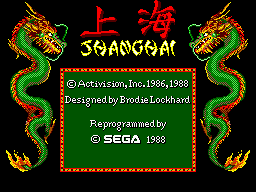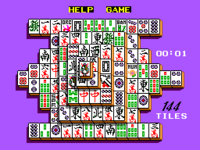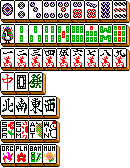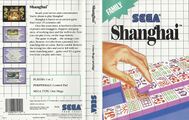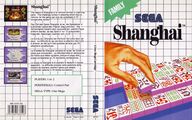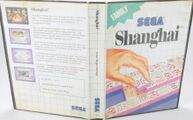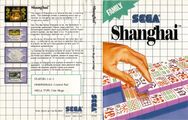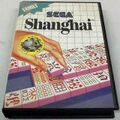Difference between revisions of "Shanghai"
From Sega Retro
(→Gameplay: tiles) |
m (→Gameplay: fixed heading level) |
||
| Line 41: | Line 41: | ||
The game starts in the Solitaire mode initially, but a new game can be started in one of the other modes through the Game menu at the top of the screen. The two multiplayer modes lack the menu options to undo moves, show all possible moves, peek at covered tiles, or restart the current game. | The game starts in the Solitaire mode initially, but a new game can be started in one of the other modes through the Game menu at the top of the screen. The two multiplayer modes lack the menu options to undo moves, show all possible moves, peek at covered tiles, or restart the current game. | ||
| − | + | ===Tiles=== | |
{{InfoTable| | {{InfoTable| | ||
{{InfoRow | {{InfoRow | ||
Revision as of 11:27, 22 January 2024
| Shanghai | ||||||||||||||||||||||||||||||
|---|---|---|---|---|---|---|---|---|---|---|---|---|---|---|---|---|---|---|---|---|---|---|---|---|---|---|---|---|---|---|
| System(s): Sega Master System | ||||||||||||||||||||||||||||||
| Publisher: Sega | ||||||||||||||||||||||||||||||
| Developer: Sega | ||||||||||||||||||||||||||||||
| Licensor: Activision | ||||||||||||||||||||||||||||||
| Peripherals supported: FM Sound Unit | ||||||||||||||||||||||||||||||
| Genre: Family[1] | ||||||||||||||||||||||||||||||
| Number of players: 2 | ||||||||||||||||||||||||||||||
| ||||||||||||||||||||||||||||||
|
Shanghai is a mahjong solitaire game developed by Activision for various home computer systems, and converted and published by Sega for the Sega Master System.
Contents
Gameplay
The object of the game is to remove all the tiles from the board by matching pairs. There are 144 tiles, which are arranged in a five-level pyramid called the "Dragon Formation" (also called a "turtle"). When two tiles are matched, they are removed from the board, exposing any tiles underneath for play. Any two seasons can form a pair, as can any two flowers, while other tiles must be matched with an identical counterpart.
Only tiles with at least one free vertical edge (meaning tiles with a free space to the left or right of them) may be matched on a turn. It is possible to remove the tiles in the wrong order and end up with an unwinnable game because there are no more matching pairs that meet this requirement. To be consistently successful, the player should strategize removing tiles that open more tiles for matching and avoid removing tiles that do not open anything (unless there are no other possible matches). The game is won when all pairs of tiles have been removed from the board or lost if no more valid moves can be made. A counter shows how many tiles are remaining, and a timer shows how long the player has taken on the current game or how much time is remaining (depending on the mode).
The game uses a cursor, which is moved using the D-Pad. The player can select a tile with ![]() or cancel a selection with
or cancel a selection with ![]() . Tiles can only be selected if they have no other tiles on top of them and a free space to either side of them. When one tile has been selected, a second tile can only be selected if it is a valid match. Pressing
. Tiles can only be selected if they have no other tiles on top of them and a free space to either side of them. When one tile has been selected, a second tile can only be selected if it is a valid match. Pressing ![]() again when two tiles are selected confirms the match and removes the tiles.
again when two tiles are selected confirms the match and removes the tiles.
There are two menus at the top of the screen that can be selected by the cursor: Help and Game. The Help menu contains items to identify any tile, undo the last move, show all possible moves (one at a time), "peek" at covered tiles by removing tiles from the board (which requires ending the game), or change the music (between three tunes). The Game menu contains items to restart the current game or start a new game in one of the three game modes.
Modes
There are three game modes:
- Solitaire: A single-player mode. The player has the option of starting with a random pattern or loading one of a dozen predetermined patterns. The shape of the formation is the same for every pattern, but the arrangement of the tiles differs.
- Tournament: A mode for multiple players to compete, where each player takes turns playing a game, sharing the same control pad. After a player completes a game (either in victory or defeat), the next game starts using the same pattern (arrangement of tiles). In between games, the best five scores are shown. Players can choose a time limit of 5, 10, or 20 minutes or no time limit for each game.
- Challenge: A two-player mode, where each player takes turns making a move on the same board, using separate control pads. Each player has a limited amount of time (5, 10, 20, 30, or 60 seconds) to complete a turn and tries to remove more tiles than the other player. The number of tiles removed for each player is shown at the top of the screen.
The game starts in the Solitaire mode initially, but a new game can be started in one of the other modes through the Game menu at the top of the screen. The two multiplayer modes lack the menu options to undo moves, show all possible moves, peek at covered tiles, or restart the current game.
Tiles
| The Suit of Dots | |
|---|---|
| A suit using dots or coins to represent the numerals 1 through 9. | |
| The Suit of Bam | |
| A suit using a peacock to represent 1 and bamboo shoots to represent 2 through 9. | |
| The Suit of Crak | |
| A suit using Chinese numerals to represent 1 through 9. The character on the bottom is 萬, representing ten thousand. | |
| The Dragons | |
| The Red Dragon, the White Dragon, and the Green Dragon. | |
| The Winds | |
| The North Wind, the South Wind, the East Wind, and the West Wind. | |
| The Seasons | |
| Spring, Summer, Autumn, and Winter. Any two seasons can form a pair. | |
| The Flowers | |
| Orchid, Plum, Mum, and Bamboo. Any two flowers can form a pair. |
Production credits
- Designed by: Brodie Lockhard (Activision)
- Programmer: Mark Cerny (Sega)
Magazine articles
- Main article: Shanghai/Magazine articles.
Physical scans
| Sega Retro Average | ||||||||||||||||||||||||||||||||||||||||||||||||||||||||||||||||||||||||||||||||||||
|---|---|---|---|---|---|---|---|---|---|---|---|---|---|---|---|---|---|---|---|---|---|---|---|---|---|---|---|---|---|---|---|---|---|---|---|---|---|---|---|---|---|---|---|---|---|---|---|---|---|---|---|---|---|---|---|---|---|---|---|---|---|---|---|---|---|---|---|---|---|---|---|---|---|---|---|---|---|---|---|---|---|---|---|---|
|
| 84 | |
|---|---|
| Based on 16 reviews | |
| Master System, SE |
|---|
|
Technical information
ROM dump status
| System | Hash | Size | Build Date | Source | Comments | |||||||||
|---|---|---|---|---|---|---|---|---|---|---|---|---|---|---|
| ✔ |
|
128kB | Cartridge (US/EU) |
References
NEC Retro has more information related to Shanghai
|
- ↑ File:Shanghai EU cover.jpg
- ↑ Computer Entertainer, "October 1988" (US; 1988-10-15), page 08
- ↑ File:1988 89 SMS UK Catalogue.pdf, page 2
- ↑ 4.0 4.1 Computer & Video Games, "January 1989" (UK; 1988-12-16), page 140
- ↑ File:Shanghai title.png
- ↑ ACE, "November 1988" (UK; 1988-xx-xx), page 58
- ↑ Complete Guide to Consoles, "" (UK; 1989-10-16), page 70
- ↑ Complete Guide to Consoles, "Volume IV" (UK; 1990-11-xx), page 106
- ↑ The Complete Guide to Sega, "" (UK; 1991-05-xx), page 61
- ↑ Console XS, "June/July 1992" (UK; 1992-04-23), page 144
- ↑ Game Mania, "May 1993" (UK; 1993-xx-xx), page 81
- ↑ Hobby Consolas, "Octubre 1991" (ES; 1991-xx-xx), page 79
- ↑ Micromanía (segunda época), "Marzo 1990" (ES; 1990-0x-xx), page 44
- ↑ Mean Machines Sega, "October 1992" (UK; 1992-09-xx), page 136
- ↑ Power Play, "11/88" (DE; 1988-10-10), page 53
- ↑ S: The Sega Magazine, "October 1990" (UK; 1990-09-06), page 21
- ↑ Sega Power, "October 1991" (UK; 1991-09-05), page 59
- ↑ Sega Pro, "April 1992" (UK; 1992-03-19), page 28
- ↑ Sega Pro, "April 1993" (UK; 1993-03-11), page 72
- ↑ User, "Dekémvrios 1991" (GR; 1991-1x-xx), page 90
| Shanghai | |
|---|---|
|
Main page | Comparisons | Hidden content | Magazine articles | Reception | |
| Shanghai games for Sega systems | |
|---|---|
| Shanghai (1988) | |
| Shanghai II (1990) | |
| Dragon's Eye Plus: Shanghai III (1991) | Shanghai II: Dragon's Eye (1994) | |
| Shanghai: Triple-Threat (1995) | Game no Tetsujin The Shanghai (1995) | Shanghai Great Moments (1996) | |
| Shanghai Dynasty (2000) | |
| Super Shanghai 2005 (2005) | |
- FM Sound Unit-compatible games
- 2 player games
- US Master System games
- All US games
- EU Master System games
- All EU games
- UK Master System games
- All UK games
- SE Master System games
- All SE games
- AU Master System games
- All AU games
- Master System games
- 1988 Master System games
- All 1988 games
- Master System table games
- All table games
- All games
- Credits without reference
- Old technical information
- Shanghai
- Shanghai (franchise)
